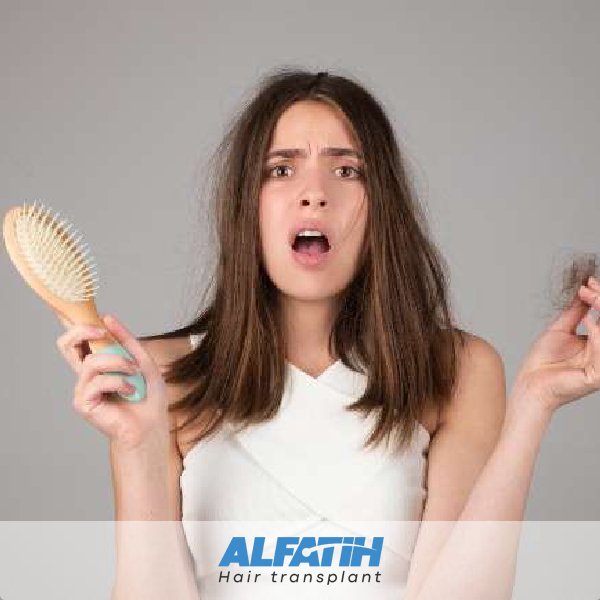Hair loss in women can be distressing and may result from various causes. Understanding these causes and exploring potential solutions can help manage the condition effectively.
Causes of Hair Loss in Women
- Hormonal Changes:
- Pregnancy, Childbirth, and Menopause: Hormonal fluctuations during these times can lead to temporary hair loss.
- Thyroid Issues: Both hypothyroidism and hyperthyroidism can cause hair thinning.
- Medical Conditions:
- Polycystic Ovary Syndrome (PCOS): Can lead to androgenic alopecia due to hormone imbalances.
- Autoimmune Diseases: Conditions like alopecia areata where the immune system attacks hair follicles.
- Medications:
- Chemotherapy: Known to cause significant hair loss.
- Medications for Arthritis, Depression, Heart Problems, and High Blood Pressure: Some of these medications have side effects that include hair loss.
- Nutritional Deficiencies:
- Lack of Protein, Iron, and Other Nutrients: Poor diet or eating disorders can result in hair loss.
- Stress:
- Physical or Emotional Stress: Can trigger telogen effluvium, a temporary form of hair loss.
- Hair Care Practices:
- Excessive Styling and Chemical Treatments: Frequent use of hair dyes, straighteners, and perms can damage hair.
- Tight Hairstyles: Styles that pull on the hair, like tight ponytails or braids, can cause traction alopecia.
- Genetic Factors:
- Female Pattern Hair Loss (FPHL): Hereditary thinning that typically occurs along the top of the head.
Solutions for Hair Loss in Women
- Medical Treatments:
- Minoxidil: Over-the-counter topical treatment approved by the FDA for female pattern hair loss.
- Anti-Androgens: Medications like spironolactone can help in cases of hormonal hair loss.
- Iron Supplements: For hair loss caused by iron deficiency.
- Lifestyle and Dietary Changes:
- Balanced Diet: Ensure adequate intake of vitamins and minerals, especially iron, zinc, and vitamins A, D, and E.
- Stress Management: Techniques like yoga, meditation, and regular exercise can reduce stress-related hair loss.
- Hair Care Practices:
- Gentle Hair Care: Avoiding excessive brushing, heat styling, and chemical treatments.
- Appropriate Hairstyles: Opt for loose hairstyles to reduce traction on the hair.
- Medical Procedures:
- Platelet-Rich Plasma (PRP) Therapy: Involves injecting platelet-rich plasma into the scalp to stimulate hair growth.
- Hair Transplants: Moving hair follicles from one part of the scalp to another can be a permanent solution for some women.
- Topical and Natural Remedies:
- Essential Oils: Some studies suggest oils like rosemary and peppermint might promote hair growth.
- Scalp Massages: Can improve circulation to the scalp and promote hair growth.
- Wigs and Hairpieces:
- Cosmetic Solutions: High-quality wigs and hairpieces can be a temporary or long-term solution for significant hair loss.
Consultation with a Specialist
It is crucial to consult a dermatologist or a hair specialist to determine the underlying cause of hair loss and to discuss the most appropriate treatment options based on individual needs and medical history.

Conclusion
Hair loss in women can be caused by a variety of factors, ranging from hormonal changes and medical conditions to lifestyle choices and genetic predisposition. By identifying the underlying cause, women can explore a range of solutions, from medical treatments and lifestyle changes to hair care practices and cosmetic options, to effectively manage and potentially reverse hair loss.


